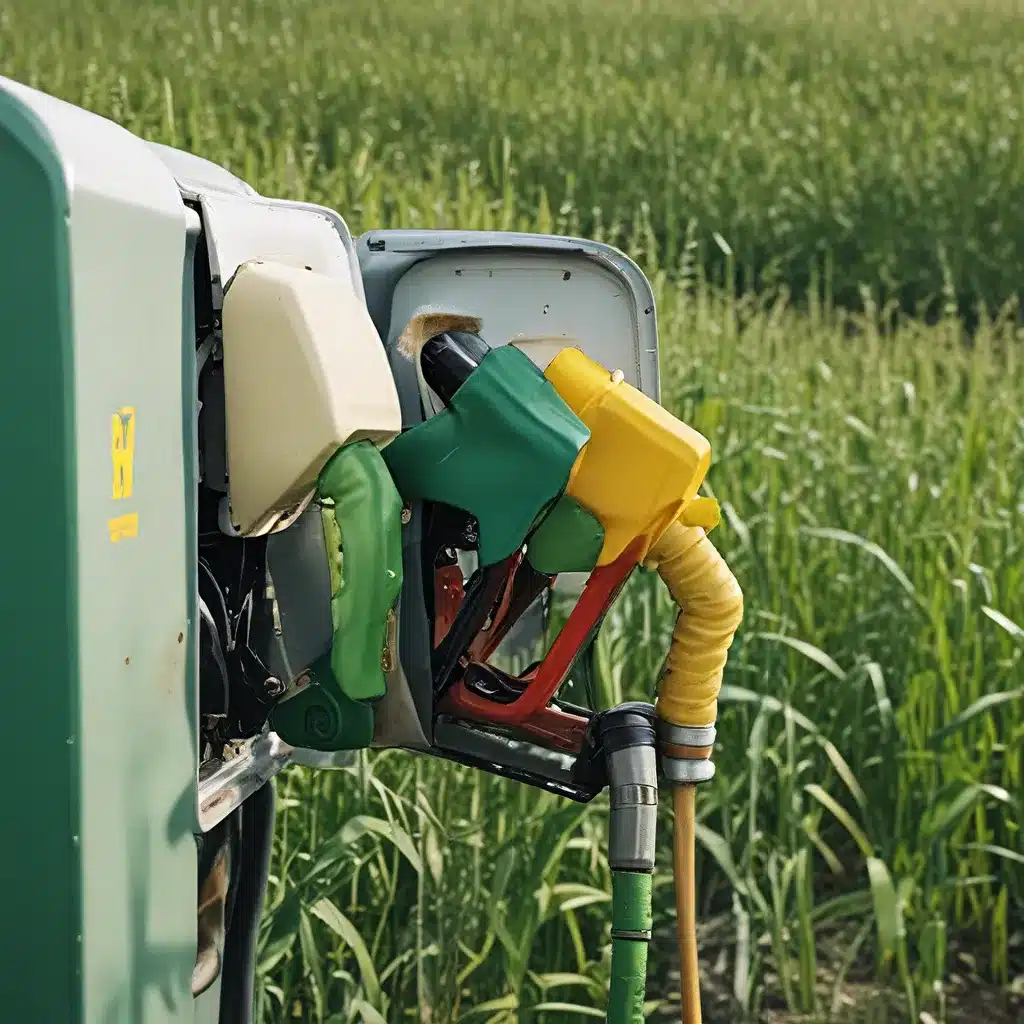
As an avid outdoorsman and nature enthusiast, I’ve always been fascinated by the intersection of energy, the environment, and technology. And when it comes to the future of sustainable fuels, few topics capture my imagination quite like biofuels. These renewable, organic-based alternatives to traditional fossil fuels hold immense promise in our fight against climate change – but they also come with a complex web of pros, cons, and policy considerations.
So, strap in, because we’re about to take a deep dive into the world of biofuel policies and their far-reaching impacts on sustainability. From the intricacies of government incentives and regulations to the unintended consequences that have emerged over the years, this is a story full of twists, turns, and a whole lot of scientific uncertainty.
The Promise of Biofuels
Let’s start with the good news. Biofuels, at their core, offer a compelling solution to some of the most pressing environmental challenges we face. Unlike fossil fuels, which are finite resources extracted from the ground, biofuels are produced from renewable organic materials – things like agricultural waste, dedicated energy crops, and even algae.
This renewable nature means that, in theory, we could sustain biofuel production indefinitely, without depleting the Earth’s natural resources. And when you consider the staggering amount of greenhouse gas emissions generated by the transportation sector, the potential for biofuels to reduce our carbon footprint is undeniably exciting.
According to the EPA, several types of biofuels could actually yield lower lifecycle greenhouse gas emissions than traditional gasoline, especially when it comes to more advanced, second- and third-generation biofuels made from non-food feedstocks. This could be a game-changer in our quest for a more sustainable future.
But the benefits of biofuels go beyond just emissions reductions. They could also help reduce our dependence on imported fossil fuels, potentially shielding us from the economic volatility and geopolitical tensions that often accompany global energy markets. And let’s not forget the potential boost to domestic agriculture and rural economies that biofuel production could provide.
The Complexities of Biofuel Policies
Now, if only it were that simple. The reality is that the story of biofuels is one of nuance, trade-offs, and ongoing policy debates. You see, while the promise of biofuels is undeniable, their actual implementation and impact have been far more complicated.
The U.S. government has taken a number of steps to incentivize and promote the production and use of biofuels, including the establishment of the Renewable Fuel Standard (RFS) and various tax credits and subsidies. The goal has been to drive innovation, spur domestic production, and ultimately, reduce greenhouse gas emissions.
But as with any major policy intervention, these efforts have had both intended and unintended consequences. For example, the diversion of agricultural crops like corn and soybeans towards biofuel production has been linked to higher food prices and potential food security issues, particularly in developing countries.
And while the RFS aimed to drive the development of advanced biofuels made from non-food feedstocks, the reality is that first-generation biofuels (made from food crops) have largely dominated the market so far. This has led some experts to question whether the policy has truly achieved its intended environmental benefits.
Furthermore, research has suggested that the indirect land-use changes spurred by biofuel production – such as the clearing of forests or grasslands to grow biofuel crops – can actually result in higher net greenhouse gas emissions than the use of fossil fuels, at least in the short-to-medium term.
So, while the policy intent behind biofuel promotion has been laudable, the real-world outcomes have been, shall we say, a bit messy. And that’s where things start to get interesting…
The Ongoing Debate and the Path Forward
As you can probably imagine, this complex web of impacts has sparked a lively and often contentious debate among policymakers, industry leaders, environmentalists, and academic researchers. And the truth is, there’s still a lot of scientific uncertainty surrounding the true environmental and economic impacts of biofuels.
Some experts argue that with the right policy frameworks and technological advancements, biofuels can still play a crucial role in decarbonizing hard-to-electrify sectors like aviation and shipping. Others, however, remain skeptical, pointing to the potential downsides and unintended consequences that have emerged over the years.
One thing is clear: the future of biofuels will depend heavily on the policies and incentives put in place to shape their development and deployment. And as with any contentious issue, there are no easy answers or one-size-fits-all solutions.
But what I find most fascinating about this topic is the sheer dynamism of it all. The field of biofuels is evolving at a breakneck pace, with new technologies, feedstocks, and production processes emerging all the time. And as our understanding of the environmental impacts continues to deepen, policymakers and industry leaders are being forced to constantly reassess and refine their approaches.
So, while the jury may still be out on the long-term viability of biofuels, one thing I’m certain of is that this is a story that’s far from over. The future of sustainable energy is being written as we speak, and biofuels are poised to play a crucial role in that unfolding narrative.
And who knows – maybe one day, as I’m out on the trails, I’ll come across a pristine forest that’s being sustainably harvested for its biofuel potential. Or perhaps I’ll spot a next-generation aircraft soaring overhead, powered by the latest in algae-based or cellulosic fuel technology.
The possibilities are endless, and I, for one, can’t wait to see what the future has in store. So why don’t you join me on this journey and explore the ever-evolving world of biofuels and sustainability? Trust me, it’s one heck of a ride.

